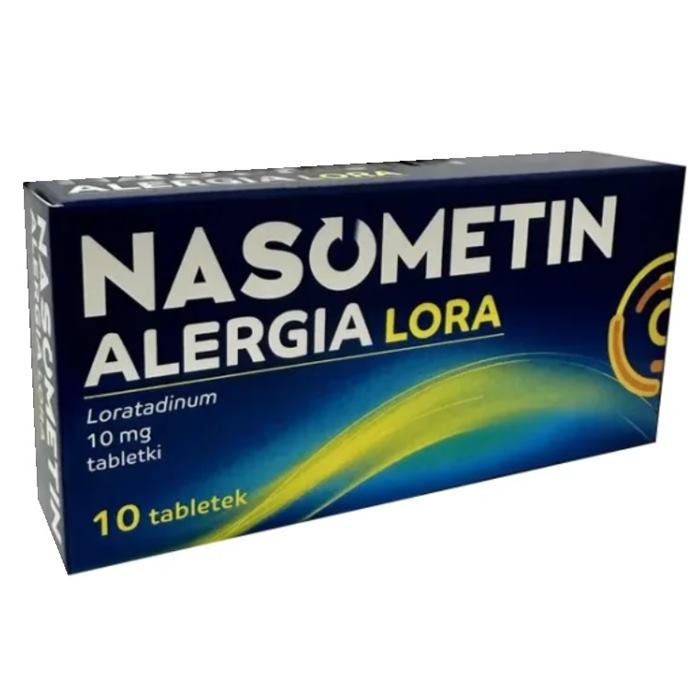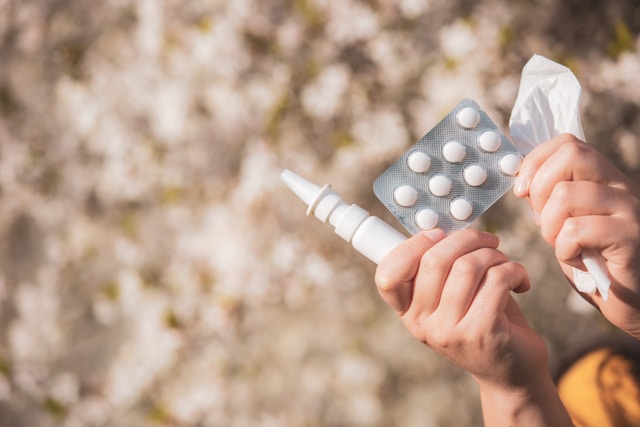

Nasometin Alergia Lora

Ask a doctor about a prescription for Nasometin Alergia Lora

How to use Nasometin Alergia Lora
Leaflet attached to the packaging: patient information
Nasometin Alergia Lora, 10 mg, tablets
Loratadine
Read the leaflet carefully before taking the medicine, as it contains
important information for the patient.
This medicine should always be taken exactly as described in the patient leaflet or as advised by
the doctor or pharmacist.
- This leaflet should be kept in case it needs to be read again.
- If advice or additional information is needed, the pharmacist should be consulted.
- If the patient experiences any side effects, including any possible side effects not listed in the leaflet, they should inform the doctor or pharmacist. See section 4.
- If there is no improvement after 10 days or the patient feels worse, they should contact a doctor.
Table of contents of the leaflet
- 1. What is Nasometin Alergia Lora and what is it used for
- 2. Important information before taking Nasometin Alergia Lora
- 3. How to take Nasometin Alergia Lora
- 4. Possible side effects
- 5. How to store Nasometin Alergia Lora
- 6. Contents of the packaging and other information
1. What is Nasometin Alergia Lora and what is it used for
Nasometin Alergia Lora is an antiallergic medicine that relieves the symptoms of allergic reactions.
Nasometin Alergia Lora is used to treat the symptoms of allergic rhinitis, such as:
sneezing,
runny or itchy nose,
itchy palate,
itchy, red, or watery eyes.
Nasometin Alergia Lora is also used to treat the symptoms of chronic idiopathic urticaria (i.e., chronic urticaria of unknown cause), such as skin itching and hives.
2. Important information before taking Nasometin Alergia Lora
When not to take Nasometin Alergia Lora:
if the patient is allergic to loratadine or any of the other ingredients of this medicine (listed in section 6).
Warnings and precautions
The patient should discuss this with their doctor or pharmacist if:
the medicine is taken for a long time;
after taking Nasometin Alergia Lora, the allergy symptoms do not subside or even worsen;
the patient has been diagnosed with severe liver function disorders;
the patient is to undergo allergic skin tests. It is necessary to discontinue the use of the medicine at least 2 days before the test to obtain reliable results. After the test, the medicine can be taken as before.
Children
The medicine should not be taken by children under 6 years of age or by children with a body weight of less than 30 kg.
Nasometin Alergia Lora and other medicines
If the patient is taking or has recently taken any of the following medicines, they should consult their doctor before taking Nasometin Alergia Lora:
cimetidine (a medicine used to reduce stomach acid secretion);
ketoconazole or fluconazole (medicines used to treat fungal infections);
erythromycin (an antibiotic);
fluoxetine (a medicine used to treat certain mental disorders).
Nasometin Alergia Lora with food, drink, and alcohol
The medicine can be taken regardless of meals.
The tablet should be swallowed whole, without chewing, with a liquid.
Nasometin Alergia Lora does not enhance the effects of alcohol, but it is not recommended to drink alcohol while taking this medicine.
Pregnancy and breastfeeding
If the patient is pregnant or breastfeeding, thinks they may be pregnant, or plans to have a child, they should consult their doctor or pharmacist before taking this medicine.
Although loratadine has not been shown to be harmful to the fetus or newborn, as a precaution, Nasometin Alergia Lora should be avoided in pregnant women.
Loratadine passes into breast milk, so it is not recommended to take Nasometin Alergia Lora during breastfeeding.
Driving and operating machines
Studies have shown that the medicine, when taken in the recommended dose, does not affect or has a negligible effect on the ability to drive or operate machines. However, very rarely, taking the medicine may cause drowsiness, which can impair the ability to perform these activities.
Nasometin Alergia Lora contains lactose
One tablet contains 69.175 mg of lactose monohydrate. If the patient has previously been diagnosed with intolerance to some sugars, they should consult their doctor before taking the medicine.
One tablet of Nasometin Alergia Lora contains less than 0.01 IU.
3. How to take Nasometin Alergia Lora
This medicine should always be taken exactly as described in the patient leaflet or as advised by the doctor or pharmacist. If in doubt, the patient should consult their doctor or pharmacist.
Adults and children over 12 years of age:1 tablet (10 mg) once a day.
Children from 6 to 12 years of age(with a body weight of more than 30 kg): 1 tablet (10 mg) once a day.
Nasometin Alergia Lora should not be taken by children with a body weight of less than 30 kg or by children under 6 years of age.
Taking Nasometin Alergia Lora without a doctor's recommendation should not exceed 10 days.
Patients with severe liver function disorders
It may be necessary to reduce the dose of the medicine. Before taking the medicine, the patient should consult their doctor, who will recommend the appropriate dosage.
Method of administration: see "Nasometin Alergia Lora with food, drink, and alcohol" in section 2.
Taking a higher dose of Nasometin Alergia Lora than recommended
If the patient has taken a higher dose of the medicine than recommended, they should immediately contact their doctor or pharmacist. Taking a higher dose than recommended may cause drowsiness, rapid heartbeat, and headache.
Symptomatic treatment is recommended. Activated charcoal in the form of a water suspension can be administered. The doctor may perform gastric lavage. Loratadine cannot be removed from the body by hemodialysis.
There is no data on the effectiveness of peritoneal dialysis.
Missing a dose of Nasometin Alergia Lora
If the patient forgets to take the medicine at the usual time, they should take it as soon as possible and then return to the usual dosing schedule. A double dose should not be taken to make up for the missed dose.
In case of any further doubts about taking this medicine, the patient should consult their doctor or pharmacist.
4. Possible side effects
Like all medicines, this medicine can cause side effects, although not everybody gets them.
Common side effects(may occur in less than 1 in 10 people):
headache, nervousness, and fatigue (in children)
drowsiness (in adults and adolescents)
Uncommon side effects(may occur in less than 1 in 100 people):
headache, increased appetite, and sleep disorders (in adults and adolescents)
Rare side effects(may occur in less than 1 in 10,000 people):
hypersensitivity reactions(including angioedema - swelling of the skin and/or mucous membranes, e.g., in the face, limbs, joints), severe allergic reactionswith sudden difficulty breathing, severe dizziness, or fainting, swelling of the face or throat (anaphylaxis). If these symptoms occur, the patient should immediatelycontact their doctor or seek medical help.
rapid heartbeat, palpitations, gastritis, nausea, liver function disorders, dry mouth, dizziness, fatigue, rash, hair loss, seizures.
Side effects with unknown frequency(frequency cannot be estimated from the available data):
weight gain
Reporting side effects
If any side effects occur, including any side effects not listed in the leaflet, the patient should inform their doctor, pharmacist, or nurse. Side effects can be reported directly to the Department of Monitoring of Adverse Reactions to Medicinal Products of the Office for Registration of Medicinal Products, Medical Devices, and Biocidal Products: Al. Jerozolimskie 181C, 02-222 Warsaw
tel.: +48 22 49 21 301, fax: +48 22 49 21 309, website: https://smz.ezdrowie.gov.pl.
Side effects can also be reported to the marketing authorization holder.
Reporting side effects will help to gather more information on the safety of the medicine.
5. How to store Nasometin Alergia Lora
The medicine should be stored out of sight and reach of children.
Store in a temperature below 25°C, in the original packaging. Protect from moisture.
Do not use this medicine after the expiry date stated on the packaging after EXP.
The expiry date refers to the last day of the month.
Medicines should not be disposed of via wastewater or household waste. The patient should ask their pharmacist how to dispose of medicines that are no longer needed. This will help protect the environment.
6. Contents of the packaging and other information
What Nasometin Alergia Lora contains
- The active substance of the medicine is loratadine. One tablet contains 10 mg of loratadine.
- The other ingredients are: lactose monohydrate, magnesium stearate, corn starch, colloidal silica anhydrous.
What Nasometin Alergia Lora looks like and what the packaging contains
Nasometin Alergia Lora tablets are white, oval, with a dividing line and the inscription LT 10.
The tablets are packaged in PVC/Aluminum blisters in a cardboard box.
The packaging contains 7, 10, or 20 tablets.
Marketing authorization holder
Sandoz GmbH
Biochemiestrasse 10
A-6250 Kundl, Austria
Manufacturer
Lek S.A.
ul. Domaniewska 50 C
02-672 Warsaw
Salutas Pharma GmbH
Otto-von-Guericke-Allee 1
D-39179 Barleben, Germany
To obtain more detailed information, please contact:
Sandoz Polska Sp. z o.o.
ul. Domaniewska 50 C
02-672 Warsaw
tel. 22 209 70 00
Sandoz logo
Date of the last update of the leaflet:
- Country of registration
- Active substance
- Prescription requiredNo
- Manufacturer
- ImporterLEK S.A. Salutas Pharma GmbH
- This information is for reference only and does not constitute medical advice. Always consult a licensed doctor before taking any medication. Oladoctor is not responsible for medical decisions based on this content.
- Alternatives to Nasometin Alergia LoraDosage form: Tablets, 10 mgActive substance: loratadineManufacturer: US Pharmacia Sp. z o.o.Prescription requiredDosage form: Tablets, 5 mg + 120 mgActive substance: loratadineManufacturer: SAG MANUFACTURING, S.L.U.Prescription not requiredDosage form: Tablets, 10 mgActive substance: loratadineManufacturer: Bayer Bitterfeld GmbHPrescription not required
Alternatives to Nasometin Alergia Lora in other countries
The best alternatives with the same active ingredient and therapeutic effect.
Alternative to Nasometin Alergia Lora in Espanha
Alternative to Nasometin Alergia Lora in Ukraine
Online doctors for Nasometin Alergia Lora
Discuss dosage, side effects, interactions, contraindications, and prescription renewal for Nasometin Alergia Lora – subject to medical assessment and local rules.















